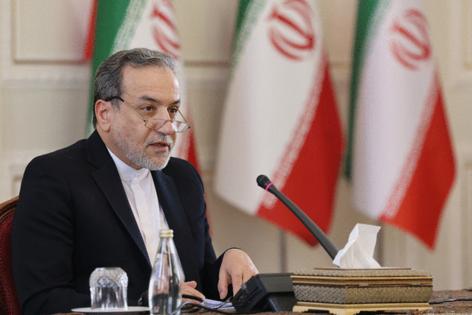Iran says it will start nuclear talks with US this weekend
Published in Political News
Iran said it will start high-level talks with the U.S. in Oman this weekend, confirming Donald Trump’s announcement that they’re planning to meet to resolve a standoff over Tehran’s nuclear program.
“The talks will be held on Saturday in Oman. They will take place in an indirect format, and we don’t accept any other method of negotiation,” Iranian Foreign Minister Abbas Araghchi said in an interview with state TV on Tuesday, adding that sanctions relief was Iran’s main goal.
The negotiations, according to Iran’s state-run Nour News, will be led by Araghchi and Steve Witkoff, the U.S. President’s special envoy for the Middle East and one of Trump’s closest advisors. Oman Foreign Minister Badr Al Busaidi will help mediate the discussions, Nour reported.
It will be the first time since September 2022 that the U.S. and Iran will take part in formal nuclear talks. It’s unclear if Witkoff and Araghchi will actually meet, with Trump, speaking at the White House on Monday alongside Israeli Prime Minister Benjamin Netanyahu, sowing some confusion by saying the talks will be direct.
“We have a very big meeting on Saturday, and we’re dealing with them directly,” Trump said. “You know, a lot of people say, ‘Oh, maybe you’re going through surrogates, you’re not dealing directly, you’re dealing through other countries.’ No — we’re dealing with them directly.”
Iranian officials insist the talks will be indirect. The two countries haven’t directly engaged at a top level since the marathon negotiations that led to the landmark nuclear deal in 2015.
The latest developments follow weeks of tension over whether the two countries could resolve their standoff diplomatically, or were headed toward conflict. Last month, Trump sent a letter to Iran’s Supreme Leader, Ayatollah Ali Khamenei, urging him to agree to a new deal or face possible military action.
Since taking office in January, Trump has revived his “maximum pressure” strategy against Iran, targeting its oil exports, the banking system and key industries. He’s said he wants to ensure Tehran never acquires a nuclear weapon, something Iranian officials have repeatedly denied they are pursuing.
Escalating tensions
Iran’s nuclear program has dominated a tense and often hostile relationship with the U.S. for more than 20 years. The two countries haven’t had formal diplomatic ties since the 1979 Islamic Revolution and have had direct contact on rare occasions, most notably when they started nuclear talks during Barack Obama’s presidency.
Those negotiations ultimately led to the 2015 accord — formally known as the Joint Comprehensive Plan of Action — that imposed strict caps on Iran’s atomic activity in exchange for sanctions relief from the U.S.
Trump withdrew the U.S. from that deal during his first term in 2018 and imposed tough sanctions on the Islamic Republic’s economy and oil exports, triggering a financial crisis in the country and unraveling billions of dollars worth of investment agreements.
That move eventually prompted Iran to significantly ramp-up its nuclear activity and it’s now likely able to produce the amount of enriched uranium needed for a bomb in less than a week, though it would take longer than that to build an atomic weapon.
The Obama-era talks included a historic handshake between U.S. Secretary of State John Kerry and his Iranian counterpart Mohammad Javad Zarif in 2015. Those images stirred anger among hardliners in both Tehran and Washington.
In January, Khamenei publicly warned his officials to be suspicious of “the smiles of diplomats” and Zarif resigned from his latest post as a foreign-policy advisor to Iran’s current president, reformist Masoud Pezeshkian, amid mounting criticism from hawkish politicians in Tehran.
This weekend, it’s likely that Iranian diplomats will be careful not to be seen directly engaging with American counterparts and Oman’s role will be key in terms of how both sides frame the talks to naysayers and supporters at home.
Iran’s economy has been struggling for years. Khamenei and the theocratic system that he governs have been broadly unpopular for some time, and the country has seen widespread protests.
Since Pezeshkian took office last July on a mandate to secure sanctions relief from the U.S., Iran’s national currency, the rial, has lost nearly two-thirds of its value against the dollar. Experts warn the country urgently needs billions in investment to revamp an aging energy infrastructure.
Tehran months ago started two sets of parallel diplomatic talks with European powers and with China and Russia. All were deeply involved in intense talks that led to the 2015 agreement and that often focused on complicated and highly technical details.
“The fact that Iran and the U.S. are preparing to hold negotiations, even if via Oman’s mediation, shows that things are starting to speed up now,” said Elena Suponina, a Moscow-based Middle East expert. “But the question is, will Trump be ready for patience when the talks hit roadblocks?”
Russia, which is hosting talks in Moscow on Tuesday with China and Iran, is still trying and facilitate a solution to the Iranian nuclear dispute, Suponina said.
©2025 Bloomberg L.P. Visit bloomberg.com. Distributed by Tribune Content Agency, LLC.




























































Comments